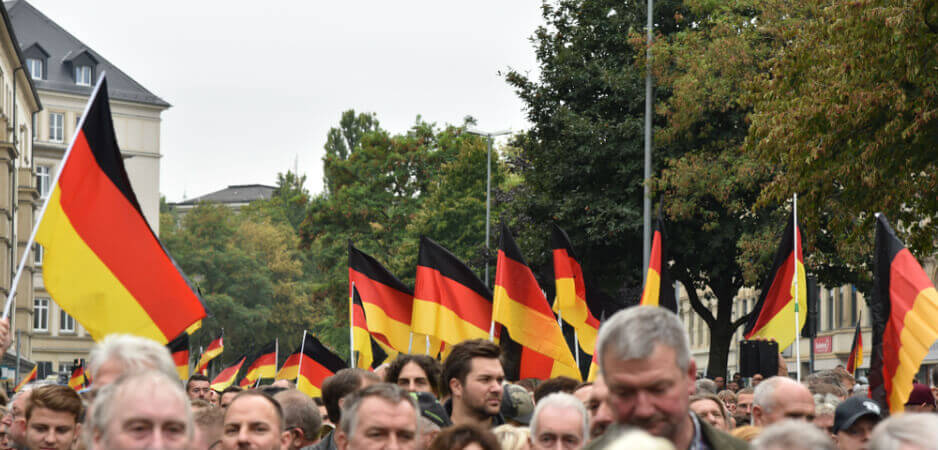While protests against Islam, migration and asylum seekers serve as a common denominator, there is little coherence in formulating a right-wing “alternative for Germany.”
The recent right-wing surge in Germany is marked by an increasing degree of dispersal among radical-right actors. New parties, movements, groupuscules, think tanks and media outlets have emerged since 2013 (when the Alternative for Germany party, the AfD, was founded), fundamentally transforming the radical-right field and causing a lack of strategic coordination and ideological coherency. Overlapping campaigns, multiple memberships and changing loyalties have rendered a picture of an internally divided movement with uncoordinated strategies and leadership. While protests against Islam, migration and asylum seekers serve as a common denominator, there is little coherence in formulating a right-wing “alternative for Germany.”
Historically, the success of the radical right strongly depended on the unity of the (radical) right, the (staged) makeup of a right-wing front against common enemies. “Unite the Right” was the slogan coined by the US alt-right in its failing effort to harmonize different right-wing currents. In Germany, the radical right is split into neo-Nazi groupuscules like the Kameradschaften, an activist movement sector with Pegida and the Identitarian Movement as spearheads, new-right think tanks, publishers and media outlets like the Institut für Staatspolitik, Antaios and Compact and, not least, a political party, the AfD, that absorbs the various resources.
While the lines increasingly blurred in the recent anti-migration and anti-government mobilizations, a platform of convergence was largely absent. Since 2015, a group called Ein Prozent für unser Land (One Percent for Our Country) has tried to fill this role. Acting as a foundation, think tank and media collective at the same time, the tiny organization has set out to become the spider in Germany’s radical right net. But how effective are these efforts in the larger picture of radical-right success in Germany?
A New Platform
“One percent of resolute people is enough to make a change”. With this counter-slogan to the Occupy Wall Street motto (“We are the 99%”) on their website, a certain elitist basic notion of Ein Prozent hovers around the self-proclaimed “largest patriotic citizen network in Germany.” This hardly comes as a surprise. Its figurehead, Philipp Stein, arose from the radical-right fraternity Germania, renowned for its chauvinist politics. Stein’s prime motive is to connect the “patriotic resistance” and to make “the people’s voice heard.”
Supporting the platform are the new-right spokesman, Götz Kubitschek, the radical-right media entrepreneur Jürgen Elsässer, and the Saxony-Anhalt AfD lawmaker Hans-Thomas Tillschneider. The overlap in the platform’s personnel and style with the Identitarian Movement is striking. It is noteworthy that Stein is internationally linked to neo-fascist movements like Casa Pound, and nationally to militant radical-right activists. Dressed in balaclava, he attacked a photographer in the city of Marburg. In addition, he is editor-in-chief of Jungeuropa Verlag, which publishes German translations of major fascist and new-right pamphlets.
Emphasizing the diversity of radical-right politics in Germany, the platform weaves its net under a new-right aegis and attempts to radicalize local citizens by funding their activities and reframing their demands.
Ein Prozent claims to be a “Greenpeace for Germans,” collecting money for distribution to local initiatives — mostly initiatives opposing migration and Islam. It also provides legal support for activists who come into conflict with the law; freely distributes its own media productions, stickers and info flyers; and offers consulting services for radical-right grassroots organizations. On its website, Ein Prozent promotes three central successes. First, the platform filed a constitutional challenge to the migration policy of Chancellor Angela Merkel in collaboration with the retired far-right Professor Karl-Albert Schachtschneider. Second, Ein Prozent organized the monitoring of the German general election of 2017, on the assumption that electoral flaws would distort the result for the AfD.
Invoking the rhetoric of the lying press and of hostile institutions that need to be under the control of the people, election monitoring became a pretext for the radical right to intervene in public debates. Third, Stein and his colleagues organized a campaign to encourage radical-right sympathizers to run for works councils positions in early 2018. This was part and parcel of a staged paradigm shift in the radical right that purported to care for the concerns of the working class.
“Civil Courage is no crime”
The focus of Ein Prozent remains on local migration-related disputes that serve to channel discontent and lead to radical-right mobilization. One specific incident showcases their action: In May 2016, the Saxonian village Arnsdorf became the center of attention when Schabas Saleh al-Aziz, a refugee from Iraq, was shackled to a tree after having allegedly stolen items from a supermarket. A vigilante group of four locals, with the support of bystanders, subdued al-Aziz and took him hostage. He was restrained for half an hour until the police released him. A video circulated that showed that no theft had taken place.
The four suspects were criminally accused of deprivation of liberty. This was the moment when Ein Prozent intervened. Challenging critical media coverage, Ein Prozent produced its own 7-minute clip featuring the voices of the right-wing vigilantes. This costly production, taking the side of the alleged perpetrators, praised them as engaged citizens who, in an act of civil courage, protected a female cashier. They called for donations for legal support, designed posters and flyers. A radical-right lawyer was organized, Ein Prozent gave €20,000 for legal support, and the case evolved into a political issue in the region.
The prosecutor and witnesses received death threats. Four months before the launch of the trial, al-Aziz was found dead in a forest nearby. The circumstances of his death could not be fully clarified. On the day of the trial, some dozens of supporters welcomed the acquitted locals — the trial was suspended due to “insignificance and a lack of public interest” — with Ein Prozent posters and flyers. Ein Prozent presented this scandalous outcome as a big success in their history allegedly showing that their activism had come to fruition.
“When the people get active, we get them connected.” This slogan, taken from a video sequence, sounds like a business model for political campaigners. In fact, it characterizes Ein Prozent as a new focal point for the radical right in Germany. While the group acted primarily online in its first months, it translated its ideas quickly into offline campaigns having the support of the whole radical right. The hybrid character of Ein Prozent makes it difficult to assess its wider influence.
Pulling the strings from offstage, Ein Prozent has found its activism and financial support becoming more and more central to building a coherent radical-right network in Germany. Emphasizing the diversity of radical-right politics in Germany, the platform weaves its net under a new-right aegis and attempts to radicalize local citizens by funding their activities and reframing their demands. Hence, they aim to translate new-right ideology into action and to serve as a point of convergence for the dispersed movement.
*[The Centre for Analysis of the Radical Right is a partner institution of Fair Observer.]
The views expressed in this article are the author’s own and do not necessarily reflect Fair Observer’s editorial policy.
Support Fair Observer
We rely on your support for our independence, diversity and quality.
For more than 10 years, Fair Observer has been free, fair and independent. No billionaire owns us, no advertisers control us. We are a reader-supported nonprofit. Unlike many other publications, we keep our content free for readers regardless of where they live or whether they can afford to pay. We have no paywalls and no ads.
In the post-truth era of fake news, echo chambers and filter bubbles, we publish a plurality of perspectives from around the world. Anyone can publish with us, but everyone goes through a rigorous editorial process. So, you get fact-checked, well-reasoned content instead of noise.
We publish 2,500+ voices from 90+ countries. We also conduct education and training programs
on subjects ranging from digital media and journalism to writing and critical thinking. This
doesn’t come cheap. Servers, editors, trainers and web developers cost
money.
Please consider supporting us on a regular basis as a recurring donor or a
sustaining member.
Will you support FO’s journalism?
We rely on your support for our independence, diversity and quality.







